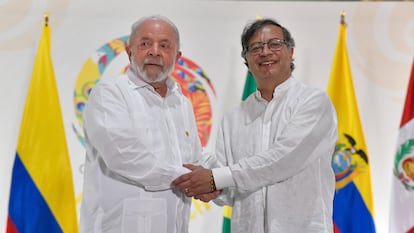Brazil’s Lula da Silva and Colombia’s Gustavo Petro: United on preserving the Amazon rainforest, divided on oil
The presidents’ discourses on the energy transition are going in opposite directions. Both men have reduced deforestation, but while Brasilia is joining OPEC as an observer, Bogota is committed to leaving fossil fuels behind


There are several parallels between the government of Luiz Inácio Lula da Silva, in Brazil, and that of Gustavo Petro, in Colombia. Both are leftists who assumed power following right-wing governments. Both lead countries that have territory in the world’s largest tropical forest, the Amazon. Therefore, it is not surprising that the two presidents led the Amazon Summit in August 2023 in Belém do Pará, Brazil, where the eight countries that share this rainforest agreed on 113 measures to protect its ecosystem. But if there is one thing for which both Lula and Petro have stood out, it is that they have managed to significantly reduce deforestation in their countries after many years.
In the middle of last year, Colombia’s Ministry of Environment announced that in 2022, 123,571 hectares of forest had been erased nationwide, which meant a 29% reduction in deforestation compared to 2021 and also represented the lowest figure reported since 2013. For its part, in Brazil, deforestation in the Amazon fell by 22.3% between August 2022 and July 2023, according to data from Brazil’s Institute for Space Research (INPE). This reduction came after the policies of Jair Bolsonaro’s immediately preceding government led to the highest level of deforestation in the region in 15 years.
However, while there are parallels between the two governments, there is also an important difference: the energy transition or, more precisely, the intention to leave fossil fuels like oil, gas and coal behind. While that divergence emerged at the Amazon Summit, where one of the main omissions was an agreement to stop expanding the Amazon’s oil and gas frontier, as Petro wanted, the difference in discourses became even more evident during the COP28 climate summit, which took place in Dubai at the end of last year.
While during this event it became public that Brazil would enter the Organization of Petroleum Exporting Countries (OPEC) in January as an observer, only a day later Petro’s government joined a bloc of countries calling for the signing of a treaty on the non-proliferation of fossil fuels. That proposal came from the small Pacific islands, which are some of the nations most threatened by climate change, and Colombia became the largest producer of coal and gas to participate in this initiative.
At the time, Lula appealed for calm. He called a press conference to explain that Brazil was joining OPEC+ as an observer that does not have to meet oil production quotas. He also said that Brazil had joined this organization to help convince the largest producers of the fossil fuel to allocate their profits toward a just transition to renewable energies.
Nevertheless, days after COP28 ended, the Brazilian government auctioned off more than 602 lots for oil and gas exploitation. Moreover, as the UN Production Gap Report notes, Brazil’s energy plan through 2032 seeks “oil and gas increases of 63% and 124%, respectively, between 2022 and 2032.″ The current administration has also said that it wants to “transform Brazil into the fourth-largest oil producer in the world.”
Ricardo Baitelo, project manager at Brazil’s Energy and Environment Institute (IEMA), told EL PAÍS that “Lula has an old culture and mentality about oil. In his mind, the profits from this production will go to health and education, as part of his second wave. But [doing] this has many negative effects.” The environmental expert explained that “renewable energies do bring necessary transformations to the country, like green jobs, and Lula knows this, which is why he also talks a lot about green hydrogen.”
But Lula’s government has also demonstrated that it intends to begin exploring for oil in the Brazilian Amazon through the state-owned Petrobras company. That idea has not been well received by environmentalists, neighbors like Petro and members of parties sympathetic to his government. “Brazil’s membership in OPEC, even as an observer, is one of the ambiguities of Brazilian environmental policy,” Juliano Medeiros, the chairman of the Socialism and Liberty Party (PSOL), noted. Faced with the fact that there is currently no oil exploitation in the Brazilian Amazon — although there is a small amount of gas exploration in the state of Amazonas — he says that PSOL has spoken out in Congress against the creation of new oil exploration wells in the region. “Now, we are discussing what the best strategy is for this to become a reality, through a bill or by forming a parliamentary front,” Medeiros added.
Petro: From discourse to reality
Petro has spoken of leaving fossil fuels behind since his presidential campaign. This discourse, at least, has been repeated in several scenarios: at his presidential inauguration, at the United Nations Assembly and, of course, at COP28. As Giovanni Pabón, the director of the Energy Department at the Transforma think tank, explains, this alone represents progress. “It is a discourse that has become a model worldwide because Colombia is a middle-income developing country with a non-diversified economy that has a high energy dependence on fossil fuels,” he says. “That has made the world take note.”
In Pabón’s view, the challenge is that the government has had a hard time translating that discourse into national policy. “The people who will be affected by that transition still see such discourse negatively,” he notes. “It is necessary to clarify what this transition is about, how much it affects us, how long it will last, and that is very important. In practice, however, there has been progress.”
For example, the policy of limiting fossil fuel subsidies is already moving forward in Colombia, despite the measure’s unpopularity. “Although that step was taken with more of an economic purpose, the price of gasoline rose almost 43% during all of 2023. This increase, which was related to a reduction of subsidies for this fuel, not only discourages its use and pushes for greater efficiency, but also prevents waste.” That decision is aligned with the country’s climate commitments. Pabón adds that the government is also working on how to phase out the 19 coal-fired power plants that are used to generate electricity in the country.
But there are still enormous challenges in other areas: in 2023, the operation of renewable energies was nearly paused, and there has not been much discussion of actions to electrify Colombia. “Today we should have almost three gigas in renewables, but we are barely at 500 megas [the Government’s goal is to achieve six gigas by 2028],” the expert clarified. Regarding electrification, he observed that “there still isn’t a policy that goes hand in hand with the energy transition.”
Finally, there is a critical issue that Colombia will have to resolve: what will happen with Ecopetrol, the state-owned oil company? The government is addressing this issue, and in the right way,” Pabón says, since the idea is to position the company as a pioneer in energy, including renewables. Currently, 90% of the company’s profits come from oil, and the government’s plan is for 30% of Ecopetrol’s profits to come from other businesses, such as renewables, by 2040. “That, along with a plan to expand tourism and the reindustrialization policy that the Ministry of Commerce still has to strengthen a lot more, would also allow Colombia to make an economic transition,” Pabón concludes.
“Brazil and Colombia have a lot in common. We are two great multicultural democracies, shaped by the valuable contribution of indigenous and Afro-descendant peoples. And we also share a commitment to putting the Amazon at the center of our policies,” President Lula wrote on X (formerly Twitter) months before the summit was held in Belém. But the truth is that the idea of completely protecting the Amazon will not be a reality as long as one of them is seduced into continuing to exploit oil, especially in that region.
Sign up for our weekly newsletter to get more English-language news coverage from EL PAÍS USA Edition
Tu suscripción se está usando en otro dispositivo
¿Quieres añadir otro usuario a tu suscripción?
Si continúas leyendo en este dispositivo, no se podrá leer en el otro.
FlechaTu suscripción se está usando en otro dispositivo y solo puedes acceder a EL PAÍS desde un dispositivo a la vez.
Si quieres compartir tu cuenta, cambia tu suscripción a la modalidad Premium, así podrás añadir otro usuario. Cada uno accederá con su propia cuenta de email, lo que os permitirá personalizar vuestra experiencia en EL PAÍS.
¿Tienes una suscripción de empresa? Accede aquí para contratar más cuentas.
En el caso de no saber quién está usando tu cuenta, te recomendamos cambiar tu contraseña aquí.
Si decides continuar compartiendo tu cuenta, este mensaje se mostrará en tu dispositivo y en el de la otra persona que está usando tu cuenta de forma indefinida, afectando a tu experiencia de lectura. Puedes consultar aquí los términos y condiciones de la suscripción digital.








































